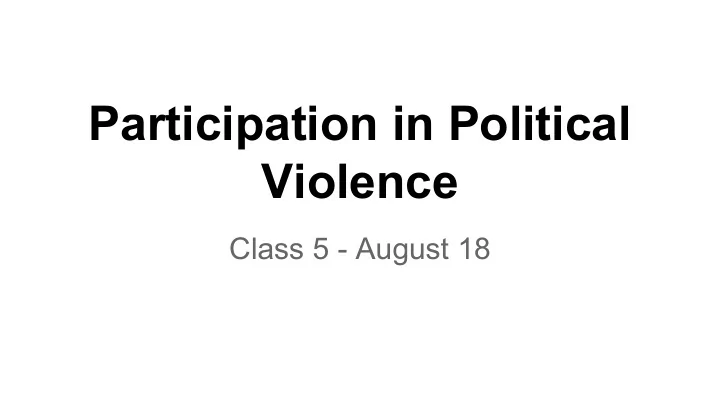

Participation in Political Violence Class 5 - August 18
Why participate in anything?
Coordination problems ● You don’t know if anyone else wants to show up and do the same thing. ● Solved with information, revealing preferences, social network diffusion. ● Solved best when norms exist for coordination within large groups of people.
Collective action problems ● Taking collective action is inherently costly. ● Your participation adds little, reward is high regardless. ○ Incentive to free-ride. ○ Impedes any participation. ● How to solve?
Solving collective action problems ● Material inducement. ● Social pressure. ● Coercion.
More difficult re: political violence ● Why risk injury, material, loss or death for a cause that is likely to fail? ● Numerous reasons for why individuals COULD participate...which one is most plausible?
Personal security ● Scacco, among others. ● Give in to coercion or physical threats from one side. ● Ensure security for property and family.
Material Gains ● Financial compensation for compensation. ● Either through salary (ISIS), robbery (RAF) or looting (rioters).
Grievances/Ideology ● Strong belief in a cause can override collective action problems. ● Disaffected individuals have less to lose in participating in costly violence.
Poverty ● Regardless of grievances, poor could have lower opportunity costs for participation. ○ Supported by some empirical research on terrorism. ● However… ○ Some studies find that wealthier and more educated people are more likely to become militants/terrorists (in Hamas/Hizbollah).
Lee 2011 ● Why does it seem that terrorists are wealthier? ● How is the argument tested? ○ DV? IV? ● Do you have any issues with the test Lee uses?
Social Pressure ● Petersen’s argument:
Social Pressure ● Petersen’s argument: ● Three stages: ○ 0=passivity ○ +1=unarmed, unorganized opposition ○ +2=participation in locally-based rebellion. ● Mechanisms ○ 0 to +1, +1 to +2, stay at +2.
0 to +1 ● Frustration builds toward occupier. ● Resentment leads to focal events. ○ Leadership is not needed. ● Community status is gained with participation or lost because of non- affiliation.
+1 to +2 ● Passive resistance demonstrates willingness to revolt. ● Everyone has a certain threshold for rebelling against an occupation.
Staying at +2 ● Difficult, but necessary. ● Threats, social or physical sanctions against group members. ○ Why are these effective?
Humphreys and Weinstein 2008 Survey of ex-combatants in Sierra Leone: How do they test each explanation? Are these credible? Which ones are significant?
Discussion ● Which explanation was most convincing? Imagine a conflict broke out in your community. Why do you think you would/wouldn’t participate? What would motivate your friends/relatives that would?
Cases: Chechnya and Indonesia
Background: Chechnya ● Deportations in 1950s. ● Declare independence in 1991. ● Separatist win war from 1994-1996. ● Overrun in subsequent invasion in 1999-present.
Chechens have long history of resistance against Russian Rule
Reasons for participation (in video)
Reasons for participation (in video) ● Sense of duty. ● Russian oppression. ● Community obligation. ● Direct killing of relatives by Russians ● Demand of commanders. Radicalization came as moderates were killed.
What explanation best explains Chechen participation?
Background: Indonesia ● Majority Muslim ● Dictatorship until 1998. ● Islamist movement with ties to Al- Qaeda: Jemaah Islamiya active
2009 Jakarta Hotel Attack ● Two hotels struck by suicide bombers. ○ 7 dead plus the bombers, mostly foreigners. ● Suspected organizers killed during apprehension.
Marriott Suicide Bomber Dani Dwi Permana ● Sentenced to two years in prison for stealing. ● Parents abandoned family. ● Found role model in local cleric, who instructed him in suicide terrorism
What motivated Dani to be a suicide bomber?
Recommend
More recommend